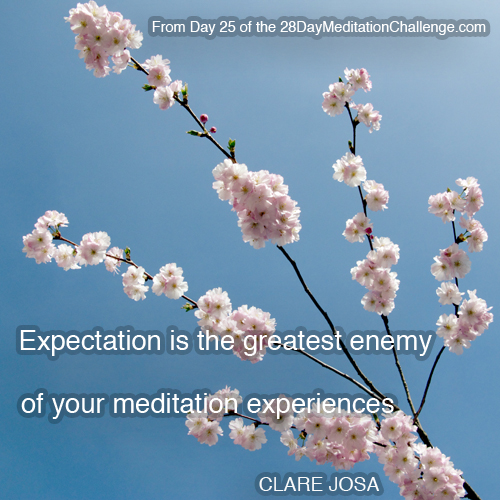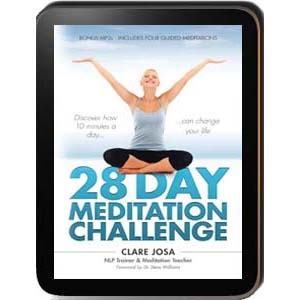DAY 25: HOW DO I KNOW WHEN I’M MEDITATING?
It’s about time we answered this question…
Login | Not a member yet? Join The 28 Day Meditation Challenge today!Want to join in with the 28 Day Meditation Challenge? Upgrade today!
Hi %%FIRST_NAME%%,
You might remember from back in the ‘Getting Started’ section that I shared how I hadn’t realised I had never really meditated before, despite 20+ years of practice, until I started to train to be a meditation teacher. I had done plenty of great deep relaxations and guided visualisations, but I had never really meditated.
How did I know?
Because once I knew the techniques to help me ‘really’ meditate (the kind of stuff we’ve been covering over the 28 days of this challenge), the experience I had of meditating was very different – much deeper and more still – than the experiences I had had of deep relaxation.
A previous 28 Day Meditation Challenge participant asked the great question, “How do I know when I’m meditating?”… and now you have been practising for 3½ weeks, I thought it was time to give you some answers.
Why didn’t I answer the question before?
Because expectation is the greatest enemy of meditation!
If I had told you to expect to see, hear or feel something specific, you would either have found your very accommodating unconscious mind creating an experience that ‘felt a bit like it, but wasn’t really it’, or you’d have felt like a failure, if you didn’t feel what I said you ‘should’.
The thing with meditation is that it feels different for each of us.
Some people find they have visions and insights. Some people find they ‘see things’ or ‘get messages’. Some people experience nothing, other than the meditation. None of this is wrong or right. It just is. Comparing your experience with that of others, and then judging yourself (or them!), isn’t helpful. It becomes an issue when we get attached to a particular way of experiencing meditation. “But I didn’t get to see such-and-such this time!” or “But I didn’t get that glowy feeling in my heart this time!”
Disappointment is the likely outcome and that’s not the reason why you’re choosing to meditate, I’m guessing.
The problem with expectation is that it confines our meditation experience to be inside a box, limited by that expectation.
If we expect to have visions, then we set our unconscious mind’s filters to watch for them, and we’re likely to miss other aspects of our meditation, because they’re not ‘on our radar’.
 The other challenge is that each meditation we do is different. If we get attached to a particular experience, then we’re making it harder for ourselves to accept whatever comes the next time, if it’s not the same. Remember, the second step of meditation is acceptance. That means practising acceptance of your experience of meditation, as well as everything else! When you have decided that acceptance will be your focus, then you open yourself up to experience the full beauty of your meditation – whatever form it happens to present itself in that day.
The other challenge is that each meditation we do is different. If we get attached to a particular experience, then we’re making it harder for ourselves to accept whatever comes the next time, if it’s not the same. Remember, the second step of meditation is acceptance. That means practising acceptance of your experience of meditation, as well as everything else! When you have decided that acceptance will be your focus, then you open yourself up to experience the full beauty of your meditation – whatever form it happens to present itself in that day.
If you ask people who are used to meditating regularly, they will have many different ways of experiencing meditation. But there’s likely to be a common theme.
Meditation includes a sense of stillness.
There’s an ancient metaphor that describes the mind as being like an ocean. The waves can be wild and stormy at the surface, but deep down there is always a gentle, flowing calm, which cannot be disturbed by even the most violent storm.
We tend to give our focus to the incessant chatter and turbulent emotions at the surface, forgetting that the deep stillness is there for us to reconnect with, whenever we choose to.
Whether it’s the mind, the body, the emotions or even something deeper than that, meditation brings a sense of stillness and peace with it. With gentle practice, this stillness – this peace – can last beyond the end of your meditation time. It can start to help you ride the waves of the rollercoaster of life and feel centred and grounded (and happier!), no matter what is going on.
Whatever meditation has been for you, so far, is just perfect.
And, if you keep meditating, your experience of it next year will be different to this year. It changes over time, as you hone your skills and learn to let go and trust.
![]() Want to share your insights or get answers to your questions on this one?
Want to share your insights or get answers to your questions on this one?
How do I know when I’m meditating?
I really hope you’re enjoying your week 4 meditation.
Day 25 Affirmation
I enjoy discovering anew, each day, what meditation and mindfulness feel like for me.
Namaste,
Clare
P. S. Tomorrow we’ll be looking at more techniques to help you sort things, if you’re still finding it hard to fit in your meditation time.
P.P.S. The key links you need for week four are:
Online Forum:
https://www.clarejosa.com/forum/28-day-meditation-challenge-online-course-1/
Week 4 Meditation:
www.28daymeditationchallenge.com/home/#week4

